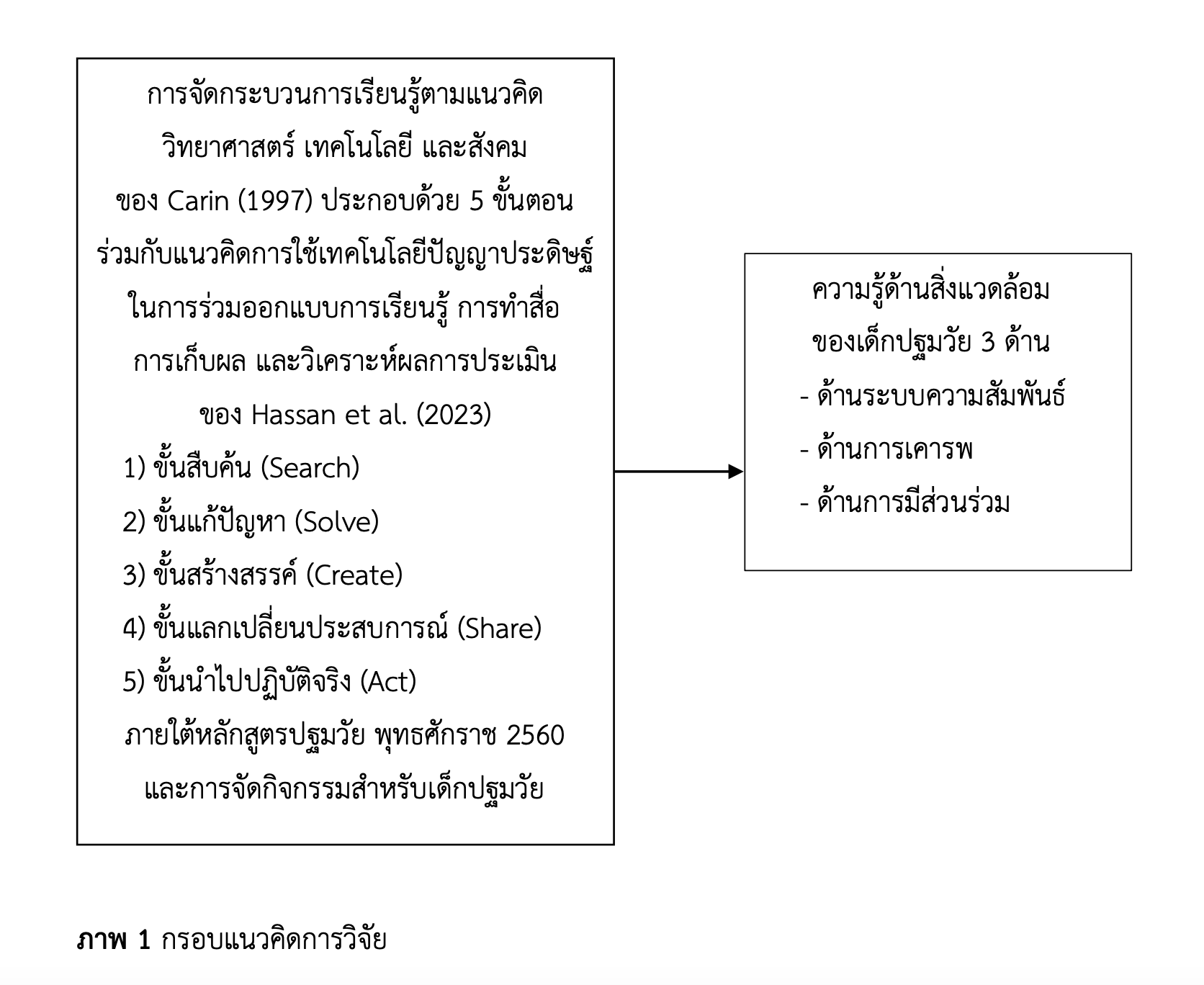การพัฒนาการจัดกระบวนการเรียนรู้ตามแนวคิดวิทยาศาสตร์ เทคโนโลยี และสังคม ร่วมกับเทคโนโลยีปัญญาประดิษฐ์ที่มีต่อความรู้ด้านสิ่งแวดล้อม สำหรับนักเรียนชั้นอนุบาล 2 โรงเรียนแห่งหนึ่งในจังหวัดเชียงใหม่
Main Article Content
บทคัดย่อ
การวิจัยครั้งนี้มีวัตถุประสงค์เพื่อศึกษาและเปรียบเทียบผลการพัฒนาการจัดกระบวนการเรียนรู้ตามแนวคิดวิทยาศาสตร์ เทคโนโลยี และสังคมร่วมกับเทคโนโลยีปัญญาประดิษฐ์ที่มีต่อความรู้ด้านสิ่งแวดล้อมสำหรับนักเรียนชั้นอนุบาล 2 โรงเรียนแห่งหนึ่งในจังหวัดเชียงใหม่ กลุ่มเป้าหมายที่ใช้ในการศึกษาครั้งนี้ คือ นักเรียนชั้นอนุบาล 2 ปีการศึกษา 2567 ภาคเรียนที่ 2 โรงเรียนแห่งหนึ่งในจังหวัดเชียงใหม่ จำนวน 23 คน เครื่องมือที่ใช้ในการวิจัยครั้งนี้ ได้แก่ 1) แผนประสบการณ์เรียนรู้ตามแนวคิดวิทยาศาสตร์ เทคโนโลยี และสังคม ร่วมกับเทคโนโลยีปัญญาประดิษฐ์ และ 2) แบบประเมินความรู้ด้านสิ่งแวดล้อมของเด็กปฐมวัย วิเคราะห์ข้อมูลโดยการหาค่าร้อยละ ค่าเฉลี่ย และส่วนเบี่ยงเบนมาตรฐาน ผลการศึกษาพบว่า 1) นักเรียนชั้นอนุบาล 2 มีความรู้ด้านสิ่งแวดล้อมก่อนได้รับการจัดกระบวนการเรียนรู้ทั้ง 3 ด้าน มีผลการประเมินไม่ผ่านเกณฑ์ โดยภาพรวมอยู่ในระดับควรพัฒนา มีค่าเฉลี่ยเท่ากับ 7.69 ส่วนเบี่ยงเบนมาตรฐานเท่ากับ 2.47 คิดเป็นร้อยละ 27.40 ซึ่งต่ำกว่าเกณฑ์ร้อยละ 70 ที่กำหนดไว้ และ 2) นักเรียนชั้นอนุบาล 2 มีความรู้ด้านสิ่งแวดล้อมหลังได้รับการจัดกระบวนการเรียนรู้ทั้ง 3 ด้าน สูงกว่าก่อนได้รับการจัดกระบวนการเรียนรู้ โดยภาพรวมอยู่ในระดับดีมาก มีค่าเฉลี่ยเท่ากับ 21.64 ส่วนเบี่ยงเบนมาตรฐานเท่ากับ 3.32 คิดเป็นร้อยละ 80.14 ซึ่งสูงกว่าเกณฑ์ร้อยละ 70 ที่กำหนดไว้
Downloads
Article Details

อนุญาตภายใต้เงื่อนไข Creative Commons Attribution-NonCommercial-NoDerivatives 4.0 International License.
The authors are solely accountable for the ideas and recommendations articulated in the articles published in The LEAD Journal RU. Should there be any inaccuracies, the authors accept full responsibility for such errors.
Moreover, the Editorial Board, Editorial Team, and Committee of The LEAD Journal RU are committed to maintaining the integrity of the principles reflected in the authors' contributions.
Consequently, Ramkhamhaeng University, the Editorial Board, Editorial Team, and Editors shall not be held liable for any outcomes arising from the authors' presentation of their ideas and recommendations within The LEAD Journal RU.
เอกสารอ้างอิง
Carin, A. (1997). Teaching Modern Science (7th ed). New Jersey: Practice-Hall.
ETS. (2023). AI and Education in 2030: Opportunities and Challenges in Learning. Retrieved May 14, 2025, from https://www.ets.kmutt.ac.th/post/ai-in-education
Ezzaim, A., Dahbi, A., Haidine, A., and Aqqal, A. (2023). AI-Based Adaptive Learning: A Systematic Mapping of the Literature. Journal of Universal Computer Science, 29(10), 1161–1197.
Hassan, K., Shazia, S., and Sihem, A. (2023). Data Management of AI-Powered Education Technologies: Challenges and Opportunities Learning Letters, 1(2), 1–11.
Karen, S. H., Jason, T. N., Rodger, W. B., Thomas, J. M., William, C. M., and Pablo, Z. (2011). Environmental Literacy Framework. Retrieved April 21, 2025, from https://naaee.org/about/ee/environmental-literacy-framework
Prachumphan, J. (2018). PM 2.5 Small Dust in the Air with the Health Crisis that Thai People Have to Face. Retrieved April 21, 2025, from https://thestandard.co/pm-2-5-environmental-nano-pollutants/. [In Thai].
Swanson, J. (2024). Perspectives on Artificial Intelligence in Education: A Conversation between an Education Futurist and An Education Strategist. Retrieved May 25, 2025, from https://ln.run/rXNeX
Taranit, C. (2022). Effects of Environmental Conservation Activities on Executive Functions in Early Childhood. (Master's Thesis, Srinakharinwirot University). [In Thai].
Ministry of Education. (2017). Early Childhood Education Curriculum B.E. 2560. Bangkok: Cooperative League of Thailand Printing House. [In Thai].
Pojantanthi, N. (2015). Science, Technology, and Society Concept. (Department of Education, Faculty of Education, Prince of Songkla University). [In Thai].
Siwalai, S., Piyanun, H., and Oraphan, B. (2022). Effect on Environmental Awareness among Early Childhood Children through the Introduction of an Activity Set under “Knowledge of Environmental Conservation among Preschool Children”. Journal of Educational Innovation and Research, 6(2), 352–365. [In Thai].
Thanonok, P. (2019). The Process of Science, Technology, and Society: Learning to Develop Analytical Thinking in Early Childhood. Journal of Education, Chulalongkorn University. 47(3), 269–289. [In Thai].
Theodorus, C. T., Melor, M. Y., and Hanita, H. I. (2025). Using AI-Powered Tools in Enhancing Reading Skills in the ESL Classroom: A Systematic Review (2020-2024). International Journal of Academic Research in Progressive Education and Development, 14(2), 57–70.
United Nations Educational, Scientific and Cultural Organization. (2020). Education for Sustainable Development: A Roadmap. France: The United Nations Educational, Scientific and Cultural Organization.


